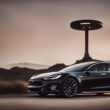How about South Korea instead of South Germany? As an alternative to Audi, BMW and Mercedes, Hyundai is now also launching its luxury subsidiary Genesis with us. The story of other premium challengers from Asia is not encouraging, but times are changing and that could play into the cards of the Koreans.
Of course, monitoring the competition is one of the core tasks of an automobile manager. But Dominique Boesch shouldn't look that closely. Because what the European boss of the luxurious Hyundai offshoot Genesis would see there should give him little hope. On the one hand, there are the South German top dogs Audi, BMW and Mercedes with an unshakable reputation and, at least in Germany, the most loyal customers in the world who are almost impossible to catch up with him. And on the other hand there are stragglers, outsiders and challengers like Jaguar or Cadillac from the west or Lexus and Infiniti from the east. And they are not the best role model either. Because none of them gets a real leg on the ground in the German league and Infiniti has even meekly ended the adventure Europe again.
But Boesch is neither intimidated by the one nor discouraged by the others.Instead, with a few months of corona delay, he is now cheerfully starting the distribution of his brand on the continent: with three flagship stores in Munich, Zurich and London and an online store The Koreans want direct sales this summer with the Sedan G80 and the technically largely identical SUV GV80 compete against cars like the Audi A6 and the BMW X5 and then quickly expand the portfolio. The G70 and GV70 are already in the starting blocks as a double of sedan and SUV in the league of three and X3 and there will soon be a compact one especially for Europe, the Koreans announce.

Brand boss Jaehoon Chang says that his fine subsidiary established itself in Korea and the USA within five years: “We believe that now is the right time for the next chapter in our brand history. We look forward to finally bringing the Genesis experience and our premium vehicles to Europe. "
However, the chances of success are extremely slim, believes automotive economist Ferdinand Dudenhöffer: "The brand lacks the unique, the special that sets it apart from Hyundai and Kia," says the professor from the Center Automotive Research in Duisburg. "Only better equipment and a nice design may be enough for success in the USA, but I can hardly imagine that in Europe." If you want to be successful in the European upper class, you need something really new, and you direct your attention to young Chinese climbers like NIO or XPeng, which he thinks is much more exciting.
Of course, Boesch also knows that success does not depend on the cars alone, especially since, in the best case scenario, they drive on a par with the competition, but cannot drive ahead of them with ambience, assistance and without any electrification, especially when it comes to the drive. That's why it's about the overall experience for him. "We know that discerning customers today long for that certain something," says the European boss: "Our mission will be to offer much more than just excellent vehicles." That is why he promises customers a transparent price structure and no discount battles all an all-round carefree package. "Here you can enjoy individual customer care, because the Korean understanding of service is top priority and this sets us apart from the competition," says Boesch and wants to provide every Genesis driver with a "personal assistant" that is otherwise only available at Maybach or Rolls- Royce there.
That could help the Koreans to a respectable success, believes Jan Burgard of the strategy consultant Berylls in Munich. Because in an increasingly fierce competition with ever new brands from the USA and especially from China as well as the rapid transformation of the supposed dinosaurs from the old world, the overall package is moving more into focus than ever, the expert is convinced: “It's not just about the vehicles, but also the digital services and the customers' experiences with the respective brand before and after the purchase, ”he outlines the triumvirate that will decide on weal and woe in the future. "If an element is missing, the respective brand will not be successful."
However, the Koreans are therefore not allowed to sleep on the product side: "It may be that the brand looks a bit old-fashioned at first glance and thus reminds a little of the beginnings of Lexus," admits Burgard. "But the customer already gets a lot of cars for his money." It is now important, however, that more electrified vehicles follow quickly, because only here are there still interesting growth rates. "Otherwise it will be very difficult to build up the brand in the already saturated market of Germany," says Burgard.
They apparently see it the same way in Korea and are therefore announcing three electric vehicles that will be on the road within a year. It starts with the one just unveiled at the Shanghai Motor Show G80 in an E version, followed by two other battery models, at least one of which will use the highly praised 800 volt architecture of the Hyundai Ioniq5.
It is quite possible that brand loyalty will be loosened, that even upper-class customers will expand their field of vision and that there is still music in the electric models, Dudenhöffer admits. But with the exception of Tesla, all ambitions for advancement from Lexus to Infiniti or Cadillac to the VW Phaeton have flopped. So the history is really bad, ”says Dudenhöffer and misses a visible competitive advantage for Genesis. In contrast to Tesla, the brand has no sweeping innovation and, unlike Mercedes or BMW, has no history. "That is why it will start as a tiger in Europe and end as a bed rug."




